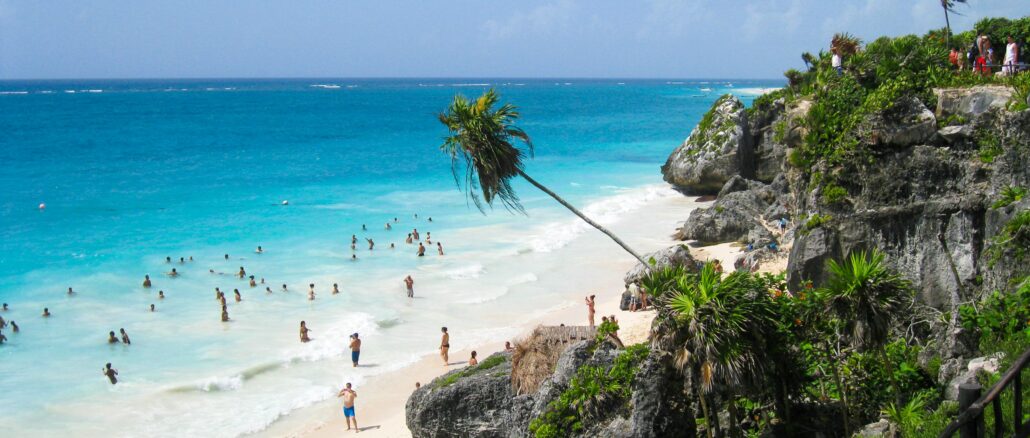
Tulum’s rapid rise brings sustainability challenges, but growing eco-conscious efforts and a strong commitment to preserving natural and Mayan heritage ensure it remains Mexico’s leading beach destination for years to come
Introduction to Tulum
Tulum, located along the Caribbean coastline of Mexico’s Yucatán Peninsula, is one of the country’s most iconic beach destinations. Situated just 80 miles south of Cancun, this once-quiet fishing village has transformed into a global hotspot known for its turquoise beaches, eco-luxury stays, and rich Mayan heritage. Its historical significance as a coastal Mayan port, combined with modern tourism development, has made Tulum a dream destination for travelers seeking both culture and relaxation.
Its proximity to ancient archaeological sites—including the famous Tulum Ruins perched over the Caribbean Sea—adds a unique dimension to its allure. Visitors can explore Mayan history in the morning and unwind at a beachfront cabana by afternoon. Today, Tulum stands at the intersection of natural beauty, cultural preservation, and sustainable tourism, welcoming travelers from around the world.
Stunning Natural Beauty
Tulum’s breathtaking natural scenery is one of its greatest attractions. Its white-sand beaches and crystal-blue waters offer a postcard-perfect tropical escape ideal for swimming, sunbathing, and water sports.
Surrounding jungles rich in biodiversity amplify the region’s charm. These lush forests provide a sanctuary for wildlife, making Tulum perfect for eco-tourism activities like nature walks and birdwatching.
Perhaps Tulum’s most iconic natural features are its cenotes—freshwater sinkholes unique to the Yucatán Peninsula. Cenotes like Gran Cenote and Casa Cenote offer visitors a magical experience with crystal-clear waters, underwater caves, and vibrant aquatic life. Whether for swimming, scuba diving, or photography, Tulum’s cenotes remain a bucket-list experience.
Rich Cultural Heritage
Once a thriving Mayan port city, Tulum is steeped in cultural and historical significance. Its archaeological zone remains one of Mexico’s most visited ancient sites, offering panoramic views of the Caribbean Sea and showcasing the architectural brilliance of the Mayan civilization.
Highlights include:
El Castillo, the iconic temple overlooking the sea
Temple of the Frescoes, famous for its murals
Temple of the Descending God, known for its unique carvings
Beyond the ruins, Tulum’s vibrant present-day Mayan community keeps traditions alive through festivals, artisanal crafts, and local cuisine. This blend of ancient legacy and modern culture gives Tulum a distinct identity unlike any other coastal destination in Mexico.
Sustainable Tourism Initiatives
Tulum has emerged as a leader in sustainable travel, appealing to eco-conscious tourists seeking environmentally responsible experiences. Local resorts and businesses are increasingly adopting green practices such as:
Solar energy systems
Rainwater harvesting
Wastewater recycling
Use of organic, locally sourced produce
Eco-lodges, low-impact boutique hotels, and nature-focused tours ensure tourism growth does not compromise Tulum’s fragile ecosystem. The community-driven approach toward sustainability helps preserve the area’s natural beauty while empowering local residents.
Vibrant Culinary Scene
Tulum’s culinary landscape is one of its major attractions. From authentic Mexican dishes to world-class fusion cuisine, the town offers a dining experience that caters to every palate.
Highlights of Tulum’s food scene include:
Fresh seafood and traditional Yucatán flavors
Farm-to-table restaurants using organic local ingredients
Fusion cuisine blending Mexican, Mediterranean, Asian, and vegan influences
A thriving street-food culture featuring tacos, tamales, and elotes
Whether you prefer fine dining under the stars or grabbing bites from local vendors, Tulum’s gastronomic diversity is second to none.
Wellness and Spiritual Retreats
Tulum is a magnet for wellness travelers seeking rejuvenation and inner balance. The town’s tranquil beaches and tropical setting make it an ideal destination for:
Yoga retreats
Meditation workshops
Sound healing sessions
Holistic therapies such as Reiki and breathwork
Detox and plant-based wellness programs
Many wellness centers incorporate traditional Mayan healing practices, giving visitors a deeper cultural and spiritual connection. With a strong emphasis on sustainability and natural living, Tulum continues to thrive as a global wellness hub.
Trendy Accommodation Options
Accommodation in Tulum is as diverse and stylish as the destination itself. Travelers can choose from:
Eco-luxury resorts with beachfront cabanas and private pools
Boutique hotels that blend sustainability with modern comfort
Budget-friendly hostels offering social events and shared activities
Private villas for secluded and upscale stays
This versatile mix ensures Tulum appeals to luxury travelers, backpackers, couples, and families alike.
Active Lifestyle and Adventure
For adventure enthusiasts, Tulum offers endless opportunities. Popular activities include:
Snorkeling in cenotes
Scuba diving in the Mesoamerican Barrier Reef
Kite-surfing along the windy Caribbean shore
Kayaking and wildlife spotting in the Sian Ka’an Biosphere Reserve
Biking along scenic coastal trails
With its combination of jungle, ocean, and protected reserves, Tulum is a thrill-seeker’s paradise.
Conclusion: The Future of Tulum
Tulum’s popularity shows no signs of slowing down—but with rapid growth comes responsibility. Over-tourism and environmental pressures pose challenges that require sustainable management. Fortunately, Tulum’s community, businesses, and travelers are increasingly prioritizing eco-friendly practices and cultural preservation.
By embracing responsible tourism, protecting natural resources, and honoring its Mayan roots, Tulum is poised to remain Mexico’s hottest beach destination for decades to come.

